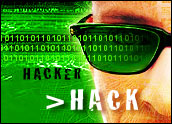
A Norwegian court is again hearing the case of prominent cracker Jon Johansen, known as “DVD Jon” for his 1999 software program that circumvents DVD copy protection, the publication of which launched a swarm of lawsuits against Web publishers, including hacker site 2600.com.
While a three-judge panel in January rejected charges that Johansen had illegally accessed his DVD movies using his own Linux-based player, Norwegian law allows the prosecution to appeal a case. Since coming up with the DVD crack DeCSS program in 1999 at the age of 15, Johansen more recently published a new computer program called QTFairUse that allows users to copy Apple iTunes collections by opening the music files and saving them without copyright protection.
Electronic Frontier Foundation staff attorney Wendy Seltzer told TechNewsWorld that the final outcome of both the Norwegian case and a related U.S. case involving the Internet posting of the DeCSS code (Copy Control Association v. Andrew Bunner) hinge on whether the widely published software program violates a trade secret.
“Basically, once the information is so widely spread, the court won’t protect it as secret as it once was,” Seltzer said of the California State Supreme Court ruling in the Bunner case.
Hollywood Hold on Oslo
In Johansen’s case in Norway, Seltzer said the retrial that is scheduled to end December 11th with a decision expected early next year is “a referendum on whether the U.S. can continue exporting its intellectual property policies across the globe.”
The court is being asked whether American law or Norwegian law is better for Norwegians, Seltzer said.
Robin Gross, executive director of IP Justice and among those supporting Johansen and his acquittal, said an overturn of the earlier ruling would make it illegal for Norwegians to circumvent digital controls on their own property. Gross added that this would include bypassing DVD region codes or other technical restrictions that would prevent users from fast-forwarding through advertisements.
Breaking Claims
Seltzer, who pointed to “explicit reverse-engineering protections in Norwegian law” as the basis for Johansen’s earlier acquittal, said resolution of the case will impact claims from the U.S. movie industry and the Copy Control Association (CCA), which have led the fight against the publishing of DeCSS.
“A final acquittal here would break apart the DVD CCA claim to hold trade secrets in DeCSS,” Seltzer said. “It means it’s not a misappropriation of trade secret.”
Johansen’s attorney in the case, Halvor Manshaus, referred to expert commercial and academic judges presiding over the appeals court and expressed confidence that the acquittal will stand.
“The facts have not changed and the legal principles stand even stronger as consumers understand the restrictive nature of the CSS license scheme,” Manshaus said in a statement.
Limitations for Lawsuits
The Motion Picture Association of America, which filed the complaint that led to charges against Johansen by Norway’s Economic Crime Unit in 2000, has conceded that the Digital Millennium Copyright Act (DMCA) — the basis for its legal pursuits — does allow for reverse engineering.
“However, the reverse engineering provisions in the DMCA were never intended to enable anyone to circumvent technical protection measures (TPMs) for the purpose of gaining unauthorized access to or making unauthorized copies of copyrighted works,” the association said.
The MPAA added that TPMs can be circumvented to ensure interoperability and the information can be shared within limitations. “However, reverse engineering is not permissible if there is a readily available commercial alternative for that purpose. In this case, there exist many commercially available DVD players,” the association said.
Ahead with Apple Crack
Regardless of his own case in Norway or related cases here in the United States, Johansen went ahead last month with the publishing of QTFairUse, which allows users to remove the copyright protection from iTunes music files.
QTFairUse is only foundational software that leaves the music file in an unplayable format and requires additional software to play, according to IP Justice.
However, the program is published under an open-source license and is available for others to build upon and incorporate into other applications and devices.





















































